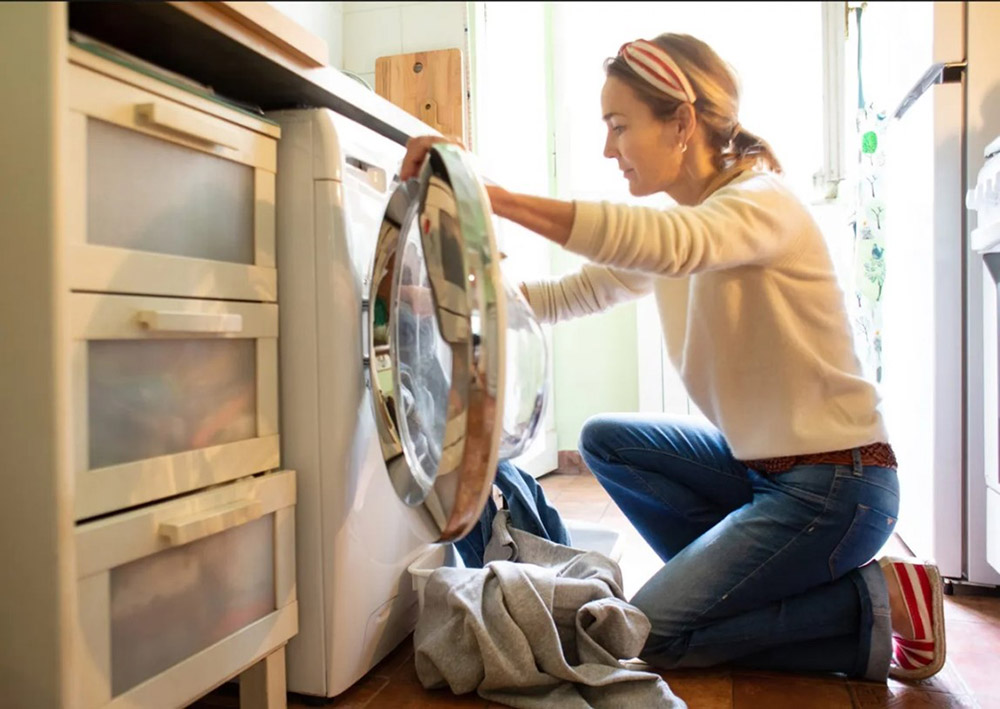
• 汰渍生产商宝洁公司(Procter & Gamble)本周表示,消费者为节省洗涤剂开支而减少洗衣频次,这一现象成为贸易战言论与市场动荡引发经济焦虑、致使消费者削减支出的最新例证。与此同时,忧心忡忡的消费者在沐浴露、零食及墨西哥卷饼等消费上也有所缩减,试图通过减少开支来应对经济动荡局面。
白宫持续变动的关税政策给经济带来了前所未有的不确定性,而这种不确定性如今已对消费者的消费习惯造成冲击。在旅行、个人护理等日常享受型消费甚至大件商品的购置上均有所缩减之后,这种不确定性已蔓延到美国民众的洗衣日常。
宝洁公司首席执行官詹慕仁(Jon Moller)向雅虎财经透露,消费者为节省洗涤剂开支,每周洗衣频次有所减少。宝洁公司是一家大型消费品集团,旗下拥有美国最畅销的洗涤剂品牌汰渍,还包括吉列(Gillette)剃须刀、帮宝适纸尿裤(Pampers)和滴然(Dawn)洗洁精在内的数十个品牌。
鉴于消费者承受经济压力,宝洁公司下调了本年度财务预期,预计增长率仅为2%。
其竞争对手高露洁-棕榄公司(Colgate-Palmolive)上周五印证了这一趋势。该公司首席执行官诺埃尔·华莱士(Noel Wallace)在财报电话会议上向投资者表示,虽然“消费者仍在刷牙、沐浴、清洁地板和喂养宠物”,但囤货意愿显著降低。
他表示:“你会发现消费者开始清空自家的食品储藏室,而且在外部环境剧烈动荡的情形下,他们不再像以往那样购置多余的牙膏或沐浴露。”他指出,“不确定性使消费者愈发谨慎和焦虑”,并称2月份发布的关税公告是“对经济体系的一记重击”,令购物者变得“格外谨慎”。
从清洁用品到零食等家庭日用品的制造商们纷纷敲响警钟,警示美国与中国及数十个全球贸易伙伴之间的关税的潜在影响。即便对依赖本土原料供应的企业而言,关税也是重大不利因素,因为关税不仅可能抑制经济增长,甚至存在将美国拖入衰退的风险,进而导致消费者支出大幅减少。
据百事公司(PepsiCo)上周四财报电话会议及《纽约时报》报道,作为汽水和多力多滋(Doritos)、奇多(Cheetos)等零食的生产商,百事公司为吸引支出减少的消费者,正推出售价低于2美元的小包装及单份装零食产品。该公司预计本年度盈利增长将持平。墨西哥卷饼连锁店Chipotle自2020年疫情封锁以来首次出现同店销售额下降的情况,其首席执行官将此归因于“消费者持观望态度”。
Chipotle首席执行官斯科特·博特赖特(Scott Boatwright)在电话会议上对投资者说:“消费者因担忧经济形势而缩减开支,这是他们减少外出就餐频率的主因。”
根据美国银行(Bank of America)的消费数据,继2月大幅下滑后,4月消费者支出暂时企稳,但整体消费情绪依然低迷。根据密歇根大学的旗舰调查,消费者信心已连续四个月下降,这是自1990年经济衰退以来消费者情绪下降幅度最大的一次,且消费者对未来一年个人财务状况的预期,也跌至该调查开展四十多年来的最低水平。
联信银行(Comerica Bank)首席经济学家比尔·亚当斯(Bill Adams)表示:“当下消费者对经济现状的悲观情绪,堪比2022年末——当时俄乌冲突叠加国内经济过热,致使家庭取暖费用飙升。”
他还补充道:“关税波动、股市震荡、通胀高企以及衰退隐忧,让消费者陷入恐慌。美国经济正滑向泥淖深处,且持续时间越长,衰退风险就越高。(财富中文网)
译者:中慧言-王芳
• 汰渍生产商宝洁公司(Procter & Gamble)本周表示,消费者为节省洗涤剂开支而减少洗衣频次,这一现象成为贸易战言论与市场动荡引发经济焦虑、致使消费者削减支出的最新例证。与此同时,忧心忡忡的消费者在沐浴露、零食及墨西哥卷饼等消费上也有所缩减,试图通过减少开支来应对经济动荡局面。
白宫持续变动的关税政策给经济带来了前所未有的不确定性,而这种不确定性如今已对消费者的消费习惯造成冲击。在旅行、个人护理等日常享受型消费甚至大件商品的购置上均有所缩减之后,这种不确定性已蔓延到美国民众的洗衣日常。
宝洁公司首席执行官詹慕仁(Jon Moller)向雅虎财经透露,消费者为节省洗涤剂开支,每周洗衣频次有所减少。宝洁公司是一家大型消费品集团,旗下拥有美国最畅销的洗涤剂品牌汰渍,还包括吉列(Gillette)剃须刀、帮宝适纸尿裤(Pampers)和滴然(Dawn)洗洁精在内的数十个品牌。
鉴于消费者承受经济压力,宝洁公司下调了本年度财务预期,预计增长率仅为2%。
其竞争对手高露洁-棕榄公司(Colgate-Palmolive)上周五印证了这一趋势。该公司首席执行官诺埃尔·华莱士(Noel Wallace)在财报电话会议上向投资者表示,虽然“消费者仍在刷牙、沐浴、清洁地板和喂养宠物”,但囤货意愿显著降低。
他表示:“你会发现消费者开始清空自家的食品储藏室,而且在外部环境剧烈动荡的情形下,他们不再像以往那样购置多余的牙膏或沐浴露。”他指出,“不确定性使消费者愈发谨慎和焦虑”,并称2月份发布的关税公告是“对经济体系的一记重击”,令购物者变得“格外谨慎”。
从清洁用品到零食等家庭日用品的制造商们纷纷敲响警钟,警示美国与中国及数十个全球贸易伙伴之间的关税的潜在影响。即便对依赖本土原料供应的企业而言,关税也是重大不利因素,因为关税不仅可能抑制经济增长,甚至存在将美国拖入衰退的风险,进而导致消费者支出大幅减少。
据百事公司(PepsiCo)上周四财报电话会议及《纽约时报》报道,作为汽水和多力多滋(Doritos)、奇多(Cheetos)等零食的生产商,百事公司为吸引支出减少的消费者,正推出售价低于2美元的小包装及单份装零食产品。该公司预计本年度盈利增长将持平。墨西哥卷饼连锁店Chipotle自2020年疫情封锁以来首次出现同店销售额下降的情况,其首席执行官将此归因于“消费者持观望态度”。
Chipotle首席执行官斯科特·博特赖特(Scott Boatwright)在电话会议上对投资者说:“消费者因担忧经济形势而缩减开支,这是他们减少外出就餐频率的主因。”
根据美国银行(Bank of America)的消费数据,继2月大幅下滑后,4月消费者支出暂时企稳,但整体消费情绪依然低迷。根据密歇根大学的旗舰调查,消费者信心已连续四个月下降,这是自1990年经济衰退以来消费者情绪下降幅度最大的一次,且消费者对未来一年个人财务状况的预期,也跌至该调查开展四十多年来的最低水平。
联信银行(Comerica Bank)首席经济学家比尔·亚当斯(Bill Adams)表示:“当下消费者对经济现状的悲观情绪,堪比2022年末——当时俄乌冲突叠加国内经济过热,致使家庭取暖费用飙升。”
他还补充道:“关税波动、股市震荡、通胀高企以及衰退隐忧,让消费者陷入恐慌。美国经济正滑向泥淖深处,且持续时间越长,衰退风险就越高。(财富中文网)
译者:中慧言-王芳
• Tide maker Procter & Gamble said this week that its customers were doing fewer loads of laundry to save money on detergent, the latest sign of a consumer pullback amid economic anxiety caused by trade-war talk and volatile markets. Elsewhere, nervous customers are spending less on body wash, snacks, and burritos as they hunker down for economic turmoil.
The White House’s ever-changing tariff regime is injecting record amounts of uncertainty into the economy, and that’s now made its way to consumers’ spending habits. After pulling back on everyday luxuries like travel and self-care and even big-ticket purchases, the uncertainty has come to settle in Americans’ laundry rooms.
Procter & Gamble CEO Jon Moller told Yahoo Finance that customers are doing fewer laundry loads each week to save on detergent. P&G, a major consumer-goods conglomerate, makes Tide, the U.S.’ best-selling detergent, as well as dozens of brands including Gillette razors, Pampers diapers, and Dawn dishwashing liquid.
It cut its financial outlook for the year due to consumer stress, to just 2% growth.
Competitor Colgate-Palmolive corroborated the trend on Friday. CEO Noel Wallace told investors on the earnings call that, while “consumers are still brushing their teeth, taking showers, cleaning their floors and feeding their pets,” they were feeling less inclined to stock up on purchases.
“You’ll see consumers destock their pantries and not necessarily buy that extra tube or that extra body wash as they see, obviously, a very volatile external environment,” he said. “Uncertainty creates a pensive and anxious consumer,” he noted, calling the February tariff announcements a “shock to the system” that made shoppers “very cautious.”
Makers of household staples from cleaning solutions to snacks are sounding the alarm over the possible impacts of tariffs on China and dozens of global trading partners. Even for companies that source domestically, tariffs represent a major headwind as they threaten to squash economic growth or possibly even lead America into a recession—which would make consumer spending dry up.
PepsiCo, which makes soda and snacks such as Doritos and Cheetos, said it was making smaller snack packs and individual servings, priced at under $2, to attract customers who were spending less, according to the company’s earnings call Thursday and the New York Times. The company expects flat earnings growth this year. And burrito chain Chipotle saw its first drop in same-store sales since the 2020 lockdowns, which the CEO attributed to “the consumer sitting on the sidelines.”
“Saving money because of concerns around the economy was the overwhelming reason consumers were reducing the frequency of restaurant visits,” Chipotle CEO Scott Boatwright told investors on a call.
So far, April consumer spending has held up after taking a dive in February, according to Bank of America spending data. But the mood is bleak. Consumer sentiment has fallen for four months straight, according to the University of Michigan’s flagship survey, the steepest decline in mood since the 1990 recession, and their assessment of where their own finances will be in a year fell to the lowest level in the 40-plus years the survey has been run.
“Consumers’ views of current conditions are as bad as at the end of 2022, when the Ukraine war and an overheating domestic economy sent home heating prices surging,” said Comerica Bank chief economist Bill Adams.
“Consumers are freaked out about tariffs, the stock market, inflation, and recession fears,” he added. “The U.S. economy is pointed in a bad direction, and the further it goes, the higher the risk of a recession.”






